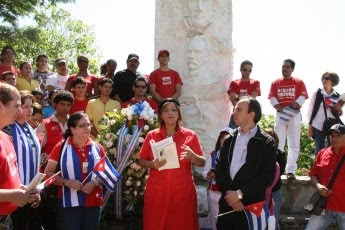By Juan Reardon
Mérida, January 21st 2011
Yesterday Venezuela began a weeklong celebration of Cuban culture by commemorating the 130th anniversary of Cuban independence hero José Martí’s arrival and extended stay in Caracas from 21 January 1881 to 27 July 1881.
Organized by Venezuela’s Ministry of Culture, the “Week of Cuban Culture” will include numerous film, music, dance, and performance art exhibitions in Caracas as well as the release of recently published books on the historical ties between Venezuela and Cuba.
 Venezuela begins a weeklong celebration of Cuban culture. Photo: Wendys Olivo.
Venezuela begins a weeklong celebration of Cuban culture. Photo: Wendys Olivo.“Martí left with his heart filled with Caracas,” said Venezuela’s Minister of Women’s Affairs, Nancy Pérez, during opening ceremonies yesterday.
“But now José Martí has returned in the millions, and thousands of Cubans are in Venezuela doing what Martí professed, they are here in the Missions helping Venezuelans,” she said. Marti is renowned for having said, “Doing is the best way of saying”.
“It is significant that we are here together today, Cubans and Venezuelans, in this homeland that belongs to everyone,” said Cuban ambassador to Venezuela Rogelio Polanco.
“Now, today, we have a Bolivarian Alliance for the People of the Americas (ALBA). Now, today, we have a Bolivarian Revolution that is paving the way for the union of the great homeland. How pleased would Martí be today seeing this [Bolivarian] Revolution and seeing our people fraternally united.”
The Venezuelan and Cuban governments are expected to approve over 200 projects of cooperation in the coming weeks. The projects were to be agreed upon in late 2010, but a second intergovernmental session to finalize details between the two countries was postponed due to record-setting rains in Venezuela.
Apart from yesterday’s opening ceremony, plans for the weeklong event include: a poetic recital entitled ‘Poets Sing to Martí’; the presentation by Doctor Edmundo Aray of the book, Venezuela in Martí, written by Mirla Alcibiades; free screenings of Cuban films for children and adults; as well as the laying of floral arrangements at Caracas’s Plaza Bolívar and Plaza Martí by representatives of the Venezuelan and Cuban governments, including, for example Humberto González, president of Venezuela’s Casa de Nuestra América José Martí and director of Venezuela’s National Library; as well as numerous theatre performances.
The closing event will be held at the Casa de Nuestra América José Martí on January 29, celebrating the 120th anniversary of the publication “Our América,” one of Martí’s most famous essays.
According to Fidel Barbarito, Director of International Relations at Venezuela’s Ministry of Culture, the celebrations are part of a newly launched program by the ministry designed to celebrate the culture of friendly nations.
“[The new program] is a way to bring the Venezuelan people closer to the way of life lived in brotherly countries, closer to the historical processes lived by those who share geographical spaces, dreams, ideals of liberty, solidarity, fraternity,” said Barbarito.
During the first quarter of 2011, Venezuela will host weeklong celebrations of a number of countries and cultures, beginning with Caribbean nations, then Bolivia, Ecuador, Russia, Vietnam and Iran, in that order.

1 comment:
red, white, and blue flags - i like that
Post a Comment
I welcome contributions to this blog. Comments are moderated.